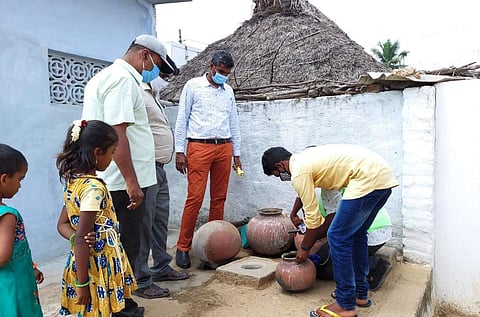

VELLORE: Even as the health department has been finding it difficult to mobilise resources to fight the COVID-19 pandemic, the authorities have got a breather as dengue cases have dropped considerably compared to last year.
Vellore region and Tiruvannamalai district have reported low numbers of dengue cases up to October this year.
Vellore district alone accounted for 77 dengue cases till October, registering a huge drop when compared to the previous year’s figures of 434, officials said.
Tiruvannamalai has reported just 19 cases till October against 205 recorded last year.
Ranipet district had 212 cases last year but this year it accounted for 73 cases till October while Tirupathur had 46 cases this year.
Dengue infections used to peak in October before gradually declining in January.
Several factors are cited for the considerable drop in dengue cases in the current year. The main reason is the coordinated preventive measures afoot in the districts to control COVID-19.
“The COVID preventive measures have been initiated as early as March this year. Extensive disinfection work was done in public places in the early stages of the COVID infection. Mosquito breeding was also targeted. The awareness among the public about infectious diseases too led to a drop in dengue cases,” said a senior officer of the health department.
Improvement of immunity thanks to the government’s precautionary measures for COVID such as distribution of immunity boosters and a wide awareness campaign too contributed to the dip in cases.
However, a few doctors argue that a kind of ‘natural balance’ has led to the lower number of dengue infections.
“It is not that aedes mosquitoes have gone. There are mosquitoes. Yet, there is a natural balance that keeps dengue infections away,” said a paediatrician working with a government hospital (GH).
Public health experts also cite increased awareness among the public, cyclic pattern and good spells of showers that led to the availability of potable water as possible reasons.
Talking to The New Indian Express, Dr K Kolandasamy, retired director of public health (DPH), said, “There have been good spells of rains from early in the year, making potable water available. So people needn’t store water and there aren’t many sources for mosquito breeding.”
He added, “Fever camps organised in large numbers to identify COVID-19 infections have also been an important factor because those found to be down with symptoms of dengue are picked up immediately for treatment.”
Although dengue cases have come down considerably, authorities should not let down their guard, he said.
“There shouldn’t be any complacency despite the fact that cases have come down. Activities like removal of scrap materials and tyres must be carried out continuously in tandem with awareness creation,” Kolandasamy stressed.